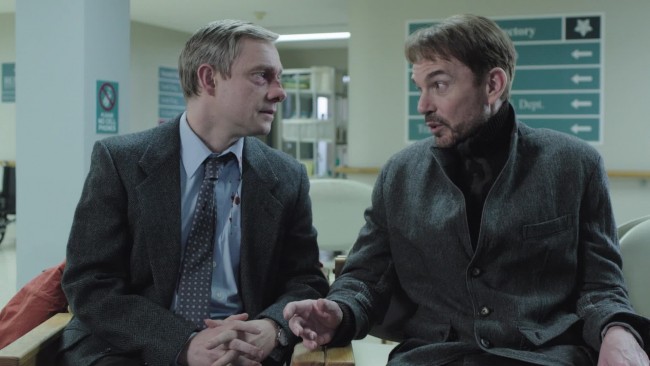If you had told me six months ago that there would be a TV show based on the Coen brothers’ 1996 Best Picture Winner FARGO on the air, and not only that, that it would be really really good, one of the best shows of the year, I would not have agreed a hundred percent with your police work. I have a dim memory of a FARGO TV adaptation in the ’90s, when the movie was still a fresh memory, with a pre-Carmela Edie Falco in the Frances McDormand role — I guess the idea was a case-of-the-week kind of show, except with big, broad Minnesota accents. Would Chief Carmela have been perpetually pregnant? We never got to find out, because the show mercifully never made it past the pilot stage.
FARGO is a great movie, probably (arguably) the best movie the Coen brothers have made, full of memorable characters, pitch-perfect performances, and one of the best scripts the Coens have ever written (which makes it one of the best scripts ever written, full stop). This is a movie I am constitutionally incapable of flipping past when I come across it on cable; the final scene is one of the best endings to any movie I can think of; it makes me tear up every. Single. Time I watch it.
[youtube id=”lj1CqBBMT54″]
To just move the veneer (gray sky, snow, crime, you betcha yaa) onto an otherwise conventional procedural would cheapen its memory, and in the process cheapen the Coens’ reputation, whether they had anything to do with the project or not. But to my great surprise, four episodes in, it turns out that FARGO (the show) isn’t an adaptation of FARGO (the movie) — it’s an homage to the Coens’ entire career, set in the most vivid world of any of their movies, and neatly sidestepping the pitfalls that so often capsize film-to-TV adaptations.
The first, crucial correct choice is to not continue the adventures of Marge Gunderson, plucky pregnant police chief; instead the show riffs on the broad strokes of the movie (a crime story set in Minnesota) to tell a whole new, fully contained season-long story, one big enough to fill an eight-episode order, but small enough to resolve itself in one season. (Like TRUE DETECTIVE, if there is a season 2 of FARGO it will be a different story with different characters.)
Many of the main characters bear distinct resemblances to characters from the movie: Martin Freeman from THE OFFICE (UK) is a weaselly coward clearly in the mold of William H. Macy, though his crime is at once more brutal and less considered than Jerry Lundegaard’s; Allison Tolman, as a young cop, is neither pregnant nor the chief, nor constantly eating, but stays on her case with a similar polite doggedness as McDormand; and Adam Goldberg and Some Other Guy I’ve Never Seen Before stand in for Steve Buscemi and Peter Stormare as a couple of hired thugs, one chatty and the other silent. To fill out the rest of the story, character types from other Coen movies are imported and retrofitted with Minnesota accents (which, in another crucial correct choice, are not overplayed): Oliver Platt plays a grocery baron not unlike Nathan Arizona; Glenn Howerton from IT’S ALWAYS SUNNY IN PHILADELPHIA is a dopey personal trainer like Brad Pitt in BURN AFTER READING; and Billy Bob Thornton, who worked with the Coens on THE MAN WHO WASN’T THERE, is doing his best work in years as an unstoppable force of chaos not unlike NO COUNTRY FOR OLD MEN’s Anton Chigurh. There hasn’t been a Walter, a Hi, an Ed, a Fink, or a Hudsucker yet, but there are still four episodes to go, so fingers crossed that we’ll get a scene with Minnesota Jeff Lebowski by season’s end (I’d at least bet we’ll have a scene set in a bowling alley).
There have also been a few hat-tips here and there to random Coen moments; most enjoyably, Thornton telling a janitor mopping a floor “You missed a spot,” a la H.I. McDonogh.
This week’s episode finally revealed that this show is a very loose sequel to the movie, as the case full of money buried in the snow by Buscemi and marked with an ice scraper reappears, and indirectly sets many of the show’s events into motion. I don’t think that means Chief Gunderson is going to pop up on the show, but if there was going to be any continuity between the show and the movie, this is definitely the best way to go about it. The plot of the show is complex, but has been so confidently presented so far (also like TRUE DETECTIVE, every episode was written by one guy, Noah Hawley) that it certainly looks like it’s going to come together in the end.
Does the show have the same kind of memorable, off-kilter dialogue as the movie, or any of the other Coens’ projects? Not really. It’s spinning a yarn, and it’s confident enough in its story and characters that it (wisely) doesn’t even try to ape the Coens’ dialogue. (If it did, it would be doomed to fail.)
My only gripe about the show, particularly now that it’s revealed itself to be a sequel to the movie, is that instead of using the amazing, melancholy, epic score from the movie — one of the best movie scores of all time in my opinion — the show is using a soundalike version. I don’t understand how you can afford the title and the premise but not the score, and hearing the soundalike version when you expect to hear the original is really distracting.
But on the whole, I recommend this show highly. Is it as good as the movie? Very little in this world is as good as the movie.
But it is one of the best shows on TV right now, you betcha.

